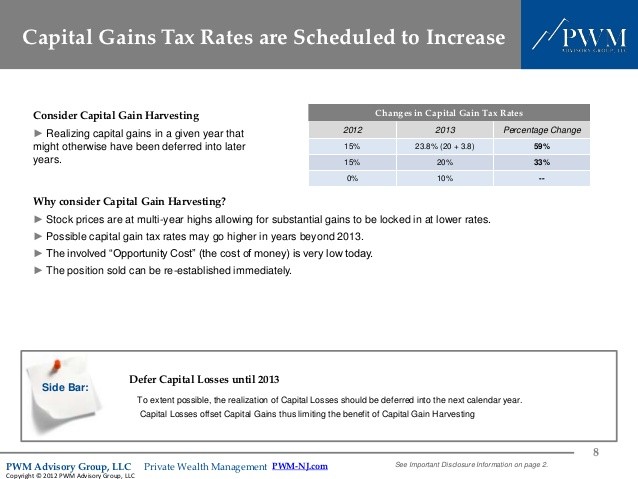2012 Tax Changes for Investors
Post on: 23 Апрель, 2015 No Comment

Will long-term capital gains get taxed more like regular income?
2012 Could Hold Big Tax Changes for Investors
For investors, what does it mean to “pay your fair share” in taxes?
Much has been made of the fact that Warren Buffett pays a lower effective tax rate than his secretary – in large part due to the difference between investment income subject to long-term capital gains taxes vs. conventional wages subject to graduated income tax brackets.
Over $388,350
Over $388,350
Here’s a real-world example: Tim Cook, the successor of Steve Jobs at Apple (NASDAQ:AAPL ), raked in $376 million from stock transactions in 2011. Presuming he held each shares for a year and a day, his tax rate is 15% on those capital gains. Meanwhile, a college grad making $40,000 a year in middle management had to pay a higher tax rate of 25% on her wages in 2011.
I’ll leave it to you to decide whether this is fair. What we’re going to explore today is what the tax talk means for your portfolio as an investor, and what changes in the tax code could mean for the broader economy.
I recently had a back-and-forth with Brad A. Badertscher, CFA, an “Assistant Professor of Accountancy” at the University of Notre Dame, to explain the finer points of the tax debate and what it means for stockholders of all sizes:
InvestorPlace: So is it true that Apple’s CEO can pay a smaller tax rate on a $376 million payday than a college grad will pay on their first paycheck?
Badertscher: You are right, the federal tax system is set up to tax people different on how they earn either income. Wages are taxed at the ordinary rate, which varies based on taxable income levels, while investment income is taxed at the capital gains rate (15%). Something else to consider is that the person with taxable income is also subject to payroll tax (2.9%) whereas the capital gains are not subject to the payroll tax.
However, as a result of the Democratic health care reform law, starting 2013, 3.8% will be added to the capital gains rate for wealthy individuals as a “Medicare tax.” In addition, if the Bush tax cuts aren’t extended, that will increase the regular capital gains rate to 20% and dividends would once again be taxed as ordinary income meaning for the wealthy, rates on dividends would jump to 39.6% from 15%.
There was a push for everyone to “pay their fair share,” even before the State of the Union this week. What are some of the ideas being proposed to shift the tax burden?
The “Buffett Rule” is probably receiving the most attention right now. Named after billionaire Warren Buffett, it calls for individuals who earn more than $1 million annually to pay a higher minimum tax rate that less-affluent individuals. This is designed to ensure that those earning $1 million or more annually do not pay a lower percentage of income in taxes than less-affluent Americans [as explained with Tim Cook and the college grad earlier].
In addition to the Buffett Rule, there has been some discussion about raising the capital gains rate to 20%, the same rate prior to the Bush tax cuts.
Everyone wants to fight the deficit but taxes can harm the economy. What’s the downside of a higher capital gains tax rate, from a macroeconomic perspective?
The biggest repercussion is that wealthy individuals are in the best position to hire employees, and therefore if you raise the tax on wealthy individuals who drive this economy, you will likely stall any positive momentum the economy has currently generated.
In addition, raising the ordinary income rate could also have a big impact on the economy. The reason being is that according to most estimates, 60% of U.S. businesses with $1 million or more in profits are structured as pass-through entities [according to a Wall Street Journal report ]. This means the owners of these business pay taxes based on ordinary income rates and not corporate tax rates. As a result, raising the ordinary income rate is likely to significantly impact all types of business owners as well.
Businesses play a key role in creating a strong economy, and given the current state of the economy its not clear we should further restrict the flow of capital by raising the capital gains tax rate or the ordinary income tax rate.
What does all this mean for individual investors? Do you think this increases the likelihood of buy-and-hold for lower tax rates? Will it scare people out of equities and cause a market contraction? Speculate, if you don’t mind.
I must admit I am not very good at speculating after all Im an accountant!
I personally do not think the issue over tax rates will be resolved until well after the election. In addition, I dont think one will see any additional volatility due to tax uncertainty in the coming year, at least as it pertains to capital gains rates. I think the corporate tax rate issue will play a much bigger role in terms of stock market volatility.
As a result, I think investors should continue to pay close attention to key drivers of the economy such as the unemployment rate and GDP growth as they consider their next investment.
Jeff Reeves is the editor of InvestorPlace.com. Write him at editor@investorplace. com , follow him on Twitter via @JeffReevesIP and become a fan of InvestorPlace on Facebook . Jeff Reeves holds a position in Alcoa, but no other publicly traded stocks.
investorplace.com/2012/01/2012-could-hold-big-tax-changes-for-investors/.














